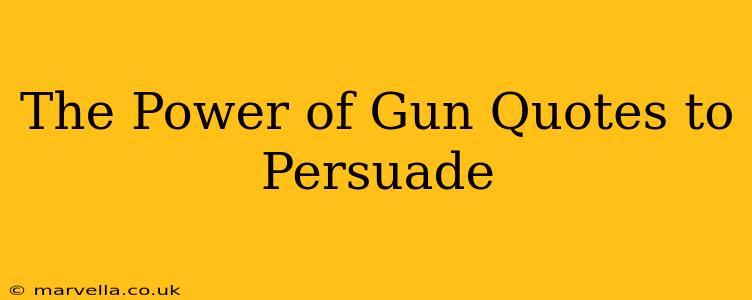The Power of Gun Quotes to Persuade: A Deep Dive into Rhetoric and Gun Control Debate
The debate surrounding gun control is one of the most polarizing in modern society. Powerful rhetoric, often delivered through carefully chosen quotes, plays a significant role in shaping public opinion and influencing policy decisions. Understanding how these quotes are used – and their inherent limitations – is crucial for navigating this complex issue. This article explores the persuasive power of gun quotes, examining their effectiveness, ethical considerations, and the importance of critical thinking when encountering such rhetoric.
What Makes a Gun Quote Persuasive?
Effective gun quotes leverage several rhetorical devices to persuade. These include:
-
Emotional Appeals: Many quotes tap into powerful emotions like fear, anger, or hope. Quotes highlighting the tragedy of gun violence evoke strong emotional responses, swaying opinions toward stricter control. Conversely, quotes emphasizing self-defense and the Second Amendment can resonate with those who prioritize individual liberty.
-
Authority and Credibility: Quotes from respected figures – politicians, celebrities, or experts – lend weight to an argument. A quote from a grieving parent, for example, can be profoundly moving and persuasive, even if it lacks statistical evidence.
-
Simplicity and Memorability: Concise, impactful quotes are more easily remembered and shared. Short, catchy phrases can become rallying cries for a particular viewpoint, shaping the narrative around gun control.
-
Framing: The context in which a quote is presented significantly influences its impact. The same quote can be used to support vastly different conclusions depending on the surrounding narrative.
How Are Gun Quotes Used in the Debate?
Gun quotes are strategically deployed across various platforms:
-
Political Campaigns: Candidates often utilize powerful quotes to mobilize support and articulate their stance on gun control.
-
Social Media: Quotes are readily shared on social media, amplifying their reach and influencing public discourse.
-
News Media: Journalists frequently quote individuals involved in gun violence incidents, policymakers, and advocacy groups to frame the debate.
-
Advocacy Groups: Both pro- and anti-gun control groups use carefully selected quotes to build support for their cause.
Are Gun Quotes Always Accurate or Ethical?
The use of gun quotes isn't without its ethical considerations:
-
Selective Quoting: Quotes can be taken out of context, distorting their original meaning and manipulating the audience's understanding.
-
Emotional Manipulation: While emotional appeals can be effective, relying solely on emotion without factual evidence can be misleading and manipulative.
-
Lack of Nuance: Complex issues like gun control are rarely captured in a single quote. Oversimplifying the debate through short, impactful statements can lead to misunderstandings and impede constructive dialogue.
What are some examples of famous gun quotes and their impact?
Many famous quotes surrounding gun control exist, each with its own impact and context. Analyzing these quotes reveals the power of rhetoric and the need for critical engagement. For instance, a quote focusing on the right to bear arms might resonate deeply with gun owners, while a quote emphasizing the need to protect children from gun violence might influence those concerned about public safety. Understanding the nuanced perspectives within such statements is crucial for a productive discussion.
How can I critically evaluate gun quotes?
Critically evaluating gun quotes requires considering:
- The source's credibility: Who said it and what is their potential bias?
- The context: Where and when was this quote used? Was it taken out of context?
- The supporting evidence: Does the quote align with factual data and research?
- The emotional impact: Is the quote primarily aimed at manipulating emotions rather than presenting reasoned arguments?
The persuasive power of gun quotes is undeniable. However, understanding the rhetorical strategies employed and critically evaluating the information presented is essential for informed participation in the gun control debate. By recognizing the limitations of relying solely on impactful quotes, we can move toward a more nuanced and productive discussion of this complex issue.

